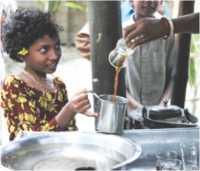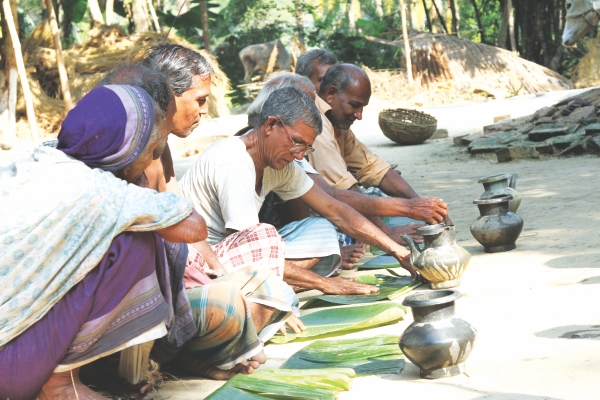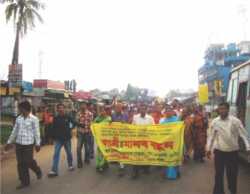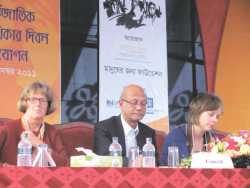| Home - Back Issues - The Team - Contact Us |
 |
| Volume 10 |Issue 48 | December 23, 2011 | |
|
|
Human Rights A Voice for the Dalits of South-Asia Naimul Karim
To say that social development strategies in South Asia have often been created with an aim to mirror the life-style of the Western countries would not be an exaggeration. Statistics, however, suggest that many of these 'pseudo-progressive' schemes increase the concentration of wealth into fewer hands, thereby creating an un-balanced society, where demands of the down-trodden are not heeded to. The three day long South-Asian Dalit Conference organised by 'Manusher Jonno', which took place at Dhaka University from 10-12 December, was a timely reminder about the mountainous tasks that lie ahead in order to provide basic human rights to a particular section of people, who have been discriminated ever since their birth in so called progressive society. The Dalits, as they are called, belong to the bottom of the Hindu Caste- System and are easily the most marginalised section of society. Better known as members of the Schedule Caste (SC), these people have been discriminated based on every possible ground: cultural, social, economical and even religious. From struggling to compete against the general public to getting stigmatised for the jobs that society has forced them to depend upon, Dalits have been compelled to lead secluded lives for centuries. Still considered as untouchables in remote areas, over the years several Dalits from South Asia have protested against their ill-treatment. With more than 160 million people belonging to the scheduled castes, India is the largest home for Dalits in the sub-continent. From 'The Prevention of Schedule Caste and Schedule Tribes Atrocities Act, passed in 1987, to providing reservations in the public sector, India is one of the few countries in the world to use the policy of 'protective discrimination' to support the Dalits. However, according to Ramesh Nathan, director, Social Awareness Society for Youths (SASY), the measures taken to protect the interests of the Dalits don't always go according to plan due to widespread corruption. “More often than not, Dalits in the parliament represent views of the mainstream political parties and not ours,” explains Nathan. Although, Dalits continue to enjoy reservations in the public sector, the increasing dominance of the private sector in India has, according to Nathan, led to their downfall. “The current policy of privatisation has created two kinds of Indians, poor Indians and extremely rich Indians. Reservation in the private sector is a must for our survival,” says Nathan. While people belonging to the SC in India struggle to cope with a capitalist economy, Dalits in Nepal, according to Durga Sob, President, Feminist Dalit Organisation (FEDO), have found it difficult to raise their concerns due to the country's unstable governance. With Dalit-women constituting around 10 percent of the country's population, they face the brunt of society's ill-treatment. “Issues like domestic violence, girls getting married at a very young age are still very prevalent,” says Sob. Although the government of Nepal officially recognises the problems of Dalits and has banned the practice of treating them as untouchables, several steps are required to ensure their progress. Sob hopes that the new constitution of Nepal will heed to the Dalits' demands and provide them with representation. There are approximately 2.8 million Dalits in Pakistan who constitute 1.5 percent of the country's population. Being a majority- Muslim country, Dalits in Pakistan fall under the non-Muslim category and have no separate laws to protect their interests. Although Dalits in Pakistan received reservation in the public sector right after independence, an amendment in 1998 converted the law into a six percent reservation scheme for all minorities, with no specific protection for the Dalits. Apart from struggling to get jobs in the public sector they also find it difficult to represent themselves at the parliament. “Currently, there is only one dalit in the parliament with majority of the reserved seats taken by upper-caste Hindus,” explains Kalavanti Raja, Pakistan's representative at the conference. She further says that Dalits face problems during elections since rich Hindu businessmen buy majority of the seats.
Like Nepal, Dalit- women in Pakistan are the most threatened section of the society. “Female Dalits are frequently kidnapped and harassed. Apart from being a Dalit, they have to bear the additional burden of being non-Muslim,” says Raja. One of the most recent instance of discrimination was witnessed during the torrential storms that caused wide-scale problems in Pakistan. According to Raja, Dalits were not allowed to enter the makeshift shelters during the calamity. The situation in Sri Lanka is no different. With majority of the Dalits working as farmers, they struggle to reap the required benefits for their survival. “They work in the agricultural sector which is one of the main sources of income for the country, yet they continue to live below the poverty line,” explains Ramaiah Nadarasa, Senior Officer, Human Development Organisation. Adding to the woes, dalits are not provided with birth certificates, which deny them the right to access government facilities. In a bid to escape the atrocities, several dalits, especially women, migrate to the Middle East. However, according to Nadarasa, they struggle to lead a better life abroad due to various discriminatory issues. Although official figures restrict the number of Dalits in Bangladesh to 5.5 million, members of the Dalit Parishad claim the presence of approximately 10 million Dalits in the country. “Due to improvements in the communication technology, we have come to know the whereabouts of many more Dalits,” says Milon Das, Bangladesh Dalit Parishad (BDP). From Rishis to Nama-Shudras, there are approximately 96 types of Dalits living across the country. Frequently discriminated, the Dalits in Bangladesh lack the kind of legal support found in India and Nepal. Although the constitution prohibits discrimination based on caste, several Dalits claim the need for protective intervention. “We want a law that specifically bans the atrocities committed on Dalits, that is the only way we can improve our stance in society,” says Milon Das.
With no reservation policies in the parliament and the public sector, Dalits in Bangladesh struggle to get their views across. Condemned to their traditional jobs such as sweeping or cleaning gutters, society looks down upon them. “The discrimination against dalits in Bangladesh have continued for so long that people find it normal today,” says Nirmal Chandra Das, General Secretary, Bangladesh Hariijan Parishad (BHP). An incident related to the cremation of Ananda Das, a dalit from Keshobpur, in October this year, perhaps best describes the situation of the SCs in the country. Nittyananda Das, relative of the deceased, was threatened by certain upper-caste Hindus when he tried to cremate the dead body according to the norms of his religion. Das was eventually cremated at a safe distance from the bigots. “To receive such kind of treatment at this age is unbearable,” exclaims Milon Das. In a bid to defend themselves and rise against injustice, committees such as the BDP and BHP have been organising rallies and conferences for the last two decades. “It is only through these demonstrations that some of our people have managed to survive and build a proper future for themselves,” explains Chandra Das. Through seminars organised by NGO'S, Dalits have managed to gain the support of various civil societies. As affirmative as that may sound, committee leaders feel that a major change can only brought about through politics. “We need a platform in politics in order to continue our protests, we have no place in the parliament, no body represents our problems,” says Chandra Das. With political parties preferring to nominate upper-caste Hindus rather than the Schedule Castes, very few candidates end up representing the Dalits during elections. Apart from the lack of representation, Dalits are also used as vote banks, based on false promises. “We fall in trouble because after the results, both parties claim that we did not vote for them, whether they win or lose. Both the parties denounce us,” explains Milon Das. Problems due to the 'no-reservation' policy can also be seen in the education sector, with Dalit-students struggling to continue studying. With the lack of basic educational facilities, Dalit-students find it difficult to compete. “Students from SC's are discarded from universities because of their poor high- school marks, which they manage to achieve with limited facilities,” says a member of the Dalit Parishad. According to Chandra Das, there have also been incidents when Dalit-students have been rejected solely due to their caste. With no respite in sight, Dalits often convert to either Islam or Christianity with an aim to walk free. However, one wonders if conversion would do them any good since they are discriminated by people from all religions. Despite the dreaded situation, Milon Das remains positive and is hopeful that the government will succumb to their demands. While Dalits in Bangladesh may be miles away from receiving reservations in the public and political sectors, they can be encouraged, by their Indian counterparts and continue their protests. Although the Indian constitution has a reservation system for SCs right from 1950 onwards, the real change, according to Dr Nathan, came in 1989. The 90s witnessed the rise of Dalit-artforms, Dalit- literature, Dalit-feminism and various other Dalit-related approaches. Nathan hopes that Dalits in India can form a sustainable political party in the future. While arguments against the policy of reservation can be made on the basis of equal-rights principle, one needs to understand that Dalits have been discriminated for several generations. The only possible way to help them would be to provide that extra push. As Milon Das puts it, “Just like a child requires extra care from his mother, we require special privileges from this country.”
Copyright (R) thedailystar.net 2011 |



